Józef Antoni Poniatowski, Prince
Grand Eagle of the Legion of Honor
Pronunciation:
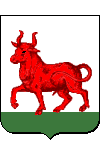
Born in Vienna's [Wien] Daun-Kinsky Palace [48.21174, 16.36432] on May 7, 1763 to an Austrian field marshal, Józef Antoni Poniatowski became a Polish prince when his uncle, King Stanislas Augustus of Poland, granted the title to his very large family. However, he continued his studies in Vienna, then Prague, and joined the Austrian army in 1780.
Soon a colonel, then aide-de-camp to Emperor Joseph II in 1788, his conquests were mainly with women, earning him the reputation of a Polish Don Juan in uniform.
In 1789, he left the Austrian army at the call of his uncle, who made him commander of his guard. And despite his admitted ignorance of military theory, the hitherto rather worldly and superficial officer was welcomed into the ranks of the commission charged with drawing up new regulations for the Polish army.
In a letter to a friend a short time earlier, he had expressed the opinion that he had neither the knowledge nor the talent required to command an army, but in 1792, in the face of the Russian invasion, he took command of the Ukrainian army. Operations were affected by the divisions in Polish society − the soldiers didn't want to be killed for the lords; some of the lords formed a Russophile party; the king ended up siding with them − and all ended with Poniatowski's indignant resignation, forcing him to retire abroad to Vienna.
After the second partition of Poland (1793), having become undesirable in Austria, he settled in Brussels. It was here that he heard of the Tadeusz Kościuszko uprising (1794). He immediately returned to Poland, where the insurgents greeted him with circumspection, seeing in him the nephew of a king who had betrayed his country, and an aristocrat. In November, he resigned his command and moved back to Vienna.
After his uncle's death in 1798, he returned to Warsaw, now a Prussian province, where he enjoyed a lavish lifestyle for several years. Throughout this period, he had no sympathy for Bonaparte, with whom several of his former comrades were fighting. On the contrary, he surrounded himself with émigrés, and was quick to support the Count of Provence when the King of Prussia authorized the latter to settle in the former Polish capital.
In 1806, he was appointed governor of Warsaw by Frederick William III, with the task of defending the city against the French invaders. He organized and armed a patriotic militia, which did not stand out for its fighting spirit. As soon as Napoleon's armies entered Warsaw (November 28, 1806), Poniatowski himself befriended their leader, Joachim Murat.
Although Napoleon I had little confidence in him, Murat's friendship won Poniatowski the command-in-chief of the Polish armed forces (January 2, 1807). His disastrous results in raising the forty thousand men demanded by the Emperor came close to costing him his office, especially as, faced with an uncertain military situation, he allowed himself to be courted by the Russophile and Germanophile parties, and Napoleon I knew it.
His situation stabilized after the Treaty of Tilsitt (July 7, 1807). In 1808, he became Minister of War and Commander-in-Chief of the armed forces of the Grand Duchy of Warsaw, devoting himself entirely to the creation of a Polish national army.
The following year, at its head, he confronted the Austrians in Galicia and defeated them. In July 1809, he occupied Krakow. Most of the liberated provinces were incorporated into the Grand Duchy.
In 1812, during the Russian campaign, he commanded the 5th Corps of the Grand Army, initially made up of three Polish divisions, with a total strength of 36,000 men. By the time they reached Moscow, however, their number had dwindled to just 4,500. These soldiers performed remarkably well, taking part in numerous battles, saving Murat from complete defeat at Winkowo, and were the first to enter the Russian capital.
Wounded during the retreat, Poniatowski had to relinquish his command and was carried by wagon the rest of the way. However, he made it a point of honor to remain at the head of his troops. They finally reached Smolensk in early December. Six hundred men and thirty cavalry remained.
Returning to Warsaw on December 12, 1812, he reorganized the Polish army and began the German campaign in 1813, leading a new corps of 22,000 men, the 8th, which joined Napoleon I in Saxony. Victorious at Löbau (September 9) and Zedtlitz (October 10), he was made Marshal on October 15, on the eve of the Battle of Leipzig.
On the evening of the third day of the battle, after a heroic defense that left him with only 800 men and the last bridge prematurely destroyed by French sappers, he died attempting to cross the Weiße Elster river on horseback.
Joseph Antoine Poniatowski's body, found on October 24, is buried in the crypt of Krakow's Cathedral-Basilica of Saints Stanislaus and Wenceslas [50.05465, 19.93538] on Wawel Hill, alongside several Polish kings, saints and heroes.
"Prince Józef Antoni Poniatowski" by Józef Kosinski (Cracovia 1753 - Warsaw 1821).
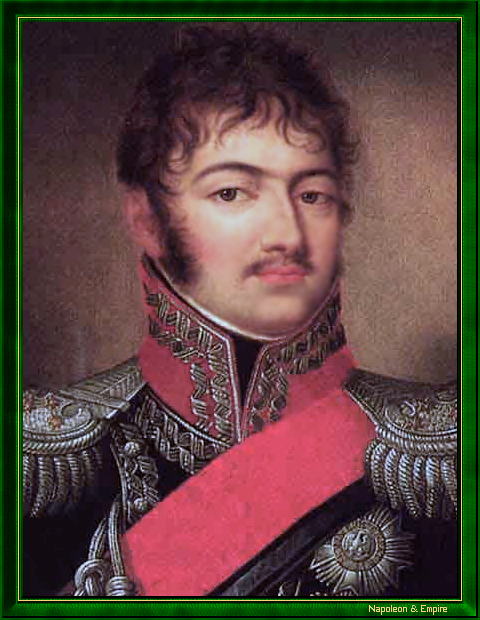
His name, spelt "Poniatowsky", is inscribed on the 13th column (east pillar) of the Arc de Triomphe de l'Etoile , while a full-length statue of the prince by Philippe Besnard honors his memory on the north façade of the Louvre, rue de Rivoli .
The Poczta Polska (Polish postal service) issued in 1992 a 1,500 Zlotys stamp featuring Prince Józef Poniatowski.
Detailed military career
Combat wounds
Wounded at the Berezina, November 26, 1812.
Lance wound to the hand near Leipzig, October 12, 1813.
By a rifle bullet in Leipzig, October 16, 1813.
Shot twice, in the arm and abdomen, in Leipzig, October 19, 1813.
Captivity
None
First engagement
Second lieutenant in the Austrian army in 1780, general in the Polish army in 1789.
Career development
Lieutenant-colonel, 1787.
Colonel, 1788.
Major General in the service of the King of Poland, 1789.
Major General, December 18, 1806.
Marshal of the Empire, October 16, 1813.
Service record
2nd Carabinieri Regiment, February 1780.
With the Emperor's dragoon regiment, in 1788.
Resigned from Austrian service and entered the service of his uncle Stanislas-Augustus, King of Poland, in 1789.
Commanded the Polish army in Ukraine against the Russians, 1792.
Commanded a division in 1794.
Refused to serve as a Russian general in 1795.
Retired to Vienna, then near Warsaw, in 1798.
Appointed Governor of Warsaw by the King of Prussia, November 1806.
Minister of War in the Warsaw provisional government, December 18, 1806.
Commander of the 1st Polish Legion in the service of France, January 2, 1807.
Minister of War of the Grand Duchy of Warsaw with the title of Generalissimo, 1808.
Commander-in-Chief of Polish, Saxon and French troops in the Grand Duchy of Warsaw, September 1808.
Fought in Galicia against Archduke Ferdinand in April and May 1809.
Commanded the 5th (Polish) Corps of the Grande Armée, March 3, 1812.
Served in Russia, 1812.
Commanded the army's right at Borodino, September 7, 1812.
Reorganized the Polish army, December 1812.
General-in-chief of the Polish rear-ban, December 20, 1812.
Commanded the 8th (Polish) Corps of the Grand Army in Poland, March 12, 1813.
Joined the Grande Armée, July 1813.
Entered Bohemia, August 19, 1813.
Served on the right of the army at Leipzig, October 16-18, 1813.
Acknowledgments
The photo of the full-length statue of Marshal Poniatowski, rue de Rivoli in Paris, was kindly provided to us by Mr. Cyril Maillet, and that of his tomb in Krakow by Mr. Ugo Valfer. We thank them.
Other portraits
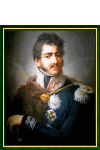
"Prince Józef Antoni Poniatowski" by Józef Grassi (Wieden 1757 - Drezno 1838).
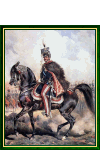
"Equestrian portrait of Józef Antoni Poniatowski", by Juliusz Kossak (Nowy Wisnicz 1824 - Cracovia 1899).
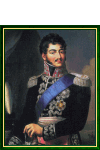
"Józef Antoni Poniatowski". Anonymous painter, nineteenth century.
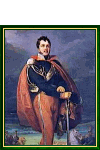
"Marshal Prince Joseph Antoine Poniatowski", by Théophile Auguste Vauchelet (Passy 1802 - Paris 1873).